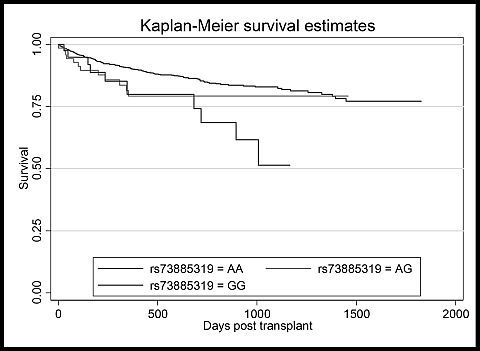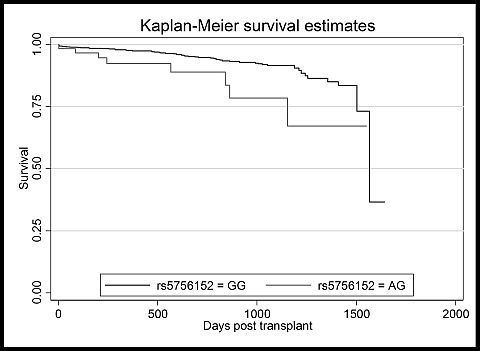APOL1 and MHY9 Gene Variants and Allograft Outcomes in Kidney Transplantation
Medicine, Hennepin County Medical Center, University of Minneosta (UMN), Minneapolis, MN
Biostatistics, UMN, Minneapolis
MMRF, Minneapolis
Pharmacy, UMN, Minneapolis
Surgery, UMN, Minneapolis
Meeting: 2013 American Transplant Congress
Abstract number: C1311
Background: Single nucleotide polymorphisms (SNPs) in APOL1 and nearby MHY9 gene have been consistently associated with increased risk of ESKD in African Americans (AA) in GWAS. In a multicenter, prospective cohort of kidney tx recips recruited between 2006-2011, we examined the association of 11 SNPs in these genes with tx outcome.
Methods: Chronic allograft dysfunction (CGD) was defined as a rise in serum creatinine (SCr) after 3 mos post-tx, that resulted in a biopsy (bx). Allograft failure (GF) is defined as return to dialysis or retx. Using an additive genetic model, separate Cox proportional hazards models were used to investigate the association of each SNP with time to CGD or GF, adjusting for recip race and stratifying by tx center.
Results: Among 1878 recips and 1,041 living donors (LDs), there were 350 AA recips and 76 AA LDs. Among recips, rs73885319 in APOL1 (minor allele frequency (MAF) = .34 in AA, and .002 in non-AA), the minor G-allele was assoc. with ↑ risk of CGD (HR = 1.62, 95% C.I. 1.07-2.45, p=0.023). Median time to CGD with this risk allele was 6 mos (range: 1-34 mos) from 3 mos post-tx baseline.

Bxs conducted for CGD showed: 18% ci≥ 2, 18% ct≥ 2, 32% i ≥2, 36% t≥ 2, 16% cv≥ 2, 5% cg≥ 2, 5% g≥ 2, 8% ah≥ 2 and 1% v≥ 2.
Among LDs, rs5756152 in MYH9 (MAF = .13 in AA, and .025 in non-AA), the minor A-allele was assoc with ↑ risk of GF (HR =2.63, 95% C.I. 1.23-5.64, p=0.013).

None of the SNPs were assoc with ↑ risk of acute rejection.
Conclusion: rs73885319 in APOL1 of recips is assoc with ↑ risk of CGD, and rs5756152 in the nearby gene MYH9 of LDs is assoc with ↑ risk of GF.
To cite this abstract in AMA style:
Israni A, Guan W, Schladt D, Oetting W, Jacobson P, Matas A, Study forDEKAFGenomics. APOL1 and MHY9 Gene Variants and Allograft Outcomes in Kidney Transplantation [abstract]. Am J Transplant. 2013; 13 (suppl 5). https://atcmeetingabstracts.com/abstract/apol1-and-mhy9-gene-variants-and-allograft-outcomes-in-kidney-transplantation/. Accessed February 10, 2026.« Back to 2013 American Transplant Congress
